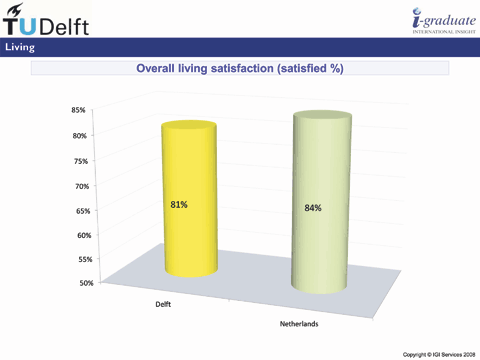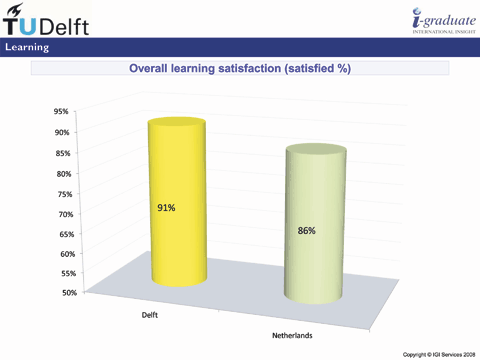Are you a satisfied international student? TU Delft wants to know, and therefore once again participated in the ‘International Student Barometer’ survey, which aims to gauge international student satisfaction levels in all areas of university life.
Last week the TU received the results from the latest survey: the Summer Wave 2008.
A Wikipedia entry for ‘international students’ might read something like: “Students from every country in the world and from every social, cultural and economic background who leave home to pursue and pay for courses of academic study at foreign universities’.
Satisfying such a disparate group of higher education ‘customers’ is a tough job for any institution anywhere in the world, never mind for one in Holland, a country mired in a severe nationwide student-housing crisis. To help monitor satisfaction levels among international students (i-students), TU Delft and hundreds of other universities worldwide employ the services of the UK-based International Graduate Insight Group (I-graduate), an independent benchmarking and research service for the educational sector.
I-graduate – whose marketing slogan is ‘Your finger on the pulse of international student opinion’ – offers universities the opportunity to gather information through a comprehensive survey called the International Student Barometer (ISB), which asks i-students to grade their satisfaction levels in three main areas: Learning (academics-related), Living (accommodation, social life, etc), and Support (university support services). The ISB survey feedback allows TU Delft to not only gauge its own i-students satisfaction levels, but also to compare its results with those from other universities in Holland and abroad.
ISB’s Summer Wave 2008 surveyed 122 universities (66 in the UK; 56 from ‘non-UK’ EU countries). The majority of those 56 non-UK EU universities were in Scandinavia. The Dutch universities included TU Delft and the universities of Amsterdam, Wageningen, Maastricht, Leiden, Groningen and Erasmus Rotterdam. From these 122 universities, 35,771 UK-based i-students, and 8,608 i-students from non-UK EU countries, answered the survey. Of those 8,608 i-student respondents, 374 were from TU Delft, with the respondents grouped in three main categories: Post Graduate (PGT) MSc students; Undergraduate (UG) BSc students; and Study Abroad students.
PGs accounted for 75% of TU Delft’s total survey respondents (or 260 of the 374 total respondents); UGs for 19% of the total (68 of the 374 respondents); and Study Abroad for 3% (10 respondents).
Of the TU’s 374 respondents, 65% were male, 35% female. The top three TU faculties in terms of survey respondents were: EEMCS (22%); Aerospace (19%); and Architecture (16%), with China (62 respondents), Belgium (31) and Indonesia (25) having the most respondents per country.
Besides i-students satisfaction levels, the survey offered a few other interesting insights, such as how i-students fund their studies: 51% of TU Delft’s PGT/MSc students said ‘Family’ paid their tuition fees and costs, while 29% said they paid with ‘Own funds’, which helps explain some of the survey’s other findings, such as MSc i-student (dis)satisfaction levels with high living and housing costs, and their inability to work more than 10 hours per week.
Progress
By now, nearly a decade into the TU’s internationalization process, many of the ISB survey’s findings – both positive and negative – are fairly common knowledge within the university’s international community and administrative departments.
The ISB’s ‘Learning’ section simply confirmed that TU Delft is strong in education, research, academic expertise…that is, in providing good, value-for-money higher technological education. Where i-student satisfaction levels drop is in the ‘Living’ area. The TU’s i-students remain less satisfied with the usual suspects: living costs, accommodation costs and housing, with, it should be noted, some of these problem areas being not only TU Delft issues, but rather national (housing shortages) and EU (a strong euro, higher living costs in northern EU countries) issues.
The ‘Learning’ section focused on 18 areas, ranging from expert teachers, course content, technology, research, and learning support, to career advice, employability, work experience and language support. Answers were given on a scale of ‘1: Very Dissatisfied’ to ‘4: Very Satisfied’. Anything above 2.8 on this scale is considered good.
For technology, expert teachers and research, the TU had highs of 3.2 to 3.3, while receiving lower marks of 2.5 and 2.6 for careers advice and work experience respectively.
Summer Wave 2008 was also compared with past waves (Spring Wave 07, Summer ‘07, Autumn ‘07), allowing TU Delft to track its historical progress. TU Delft showed improvement in all areas when compared with Summer Wave 2007, as reflected in the survey’s ‘comments’ section.
“The learning experience at TU Delft implies not only gathering knowledge, but, moreover, developing skills. However, my greatest achievement here is that I’ve learned how to learn!” exclaimed ‘PG from Romania’. While ‘PG from Ecuador’ commented that the “level of education is very good and sometimes quite difficult, especially at the beginning, but that is just part of the process.”
Living
The survey’s second section focused on ‘Living’, which included areas like quality of accommodation, cost of living, safety, having host country friends (i.e. Dutch students), sports activities, transport, etc.
In terms of overall ‘Living’ satisfaction, TU Delft’s i-students weren’t wholly satisfied in all areas: accommodation quality, accommodation cost, living costs, host friends and the ability to earn money while studying all showed room for improvement. For ‘Living’ generally, TU Delft scored lower (81% satisfied) than the average for all Dutch universities combined (84% satisfied), which was also reflected in respondent comments.
“I’d really value the opportunity to be able to integrate with Dutch students more on every level – especially as far as housing is concerned,” said ‘PG from South Africa’. While ‘PG from Colombia’ remarked: “I lived six months in the ‘space boxes’ and although at the beginning it can be quite a normal accommodation facility, it’s not a natural place for people…people get stressed and lonely easily.”
The next ISB survey – Autumn Wave 2008 – will be offered in late October. The various TU departments involved with internationalization will hope that more i-students take part in this survey. And watch this space: the English Page will run a follow-up article detailing the TU’s response to the results of the Summer Wave 2008 survey.
,




A Wikipedia entry for ‘international students’ might read something like: “Students from every country in the world and from every social, cultural and economic background who leave home to pursue and pay for courses of academic study at foreign universities’.
Satisfying such a disparate group of higher education ‘customers’ is a tough job for any institution anywhere in the world, never mind for one in Holland, a country mired in a severe nationwide student-housing crisis. To help monitor satisfaction levels among international students (i-students), TU Delft and hundreds of other universities worldwide employ the services of the UK-based International Graduate Insight Group (I-graduate), an independent benchmarking and research service for the educational sector.
I-graduate – whose marketing slogan is ‘Your finger on the pulse of international student opinion’ – offers universities the opportunity to gather information through a comprehensive survey called the International Student Barometer (ISB), which asks i-students to grade their satisfaction levels in three main areas: Learning (academics-related), Living (accommodation, social life, etc), and Support (university support services). The ISB survey feedback allows TU Delft to not only gauge its own i-students satisfaction levels, but also to compare its results with those from other universities in Holland and abroad.
ISB’s Summer Wave 2008 surveyed 122 universities (66 in the UK; 56 from ‘non-UK’ EU countries). The majority of those 56 non-UK EU universities were in Scandinavia. The Dutch universities included TU Delft and the universities of Amsterdam, Wageningen, Maastricht, Leiden, Groningen and Erasmus Rotterdam. From these 122 universities, 35,771 UK-based i-students, and 8,608 i-students from non-UK EU countries, answered the survey. Of those 8,608 i-student respondents, 374 were from TU Delft, with the respondents grouped in three main categories: Post Graduate (PGT) MSc students; Undergraduate (UG) BSc students; and Study Abroad students.
PGs accounted for 75% of TU Delft’s total survey respondents (or 260 of the 374 total respondents); UGs for 19% of the total (68 of the 374 respondents); and Study Abroad for 3% (10 respondents).
Of the TU’s 374 respondents, 65% were male, 35% female. The top three TU faculties in terms of survey respondents were: EEMCS (22%); Aerospace (19%); and Architecture (16%), with China (62 respondents), Belgium (31) and Indonesia (25) having the most respondents per country.
Besides i-students satisfaction levels, the survey offered a few other interesting insights, such as how i-students fund their studies: 51% of TU Delft’s PGT/MSc students said ‘Family’ paid their tuition fees and costs, while 29% said they paid with ‘Own funds’, which helps explain some of the survey’s other findings, such as MSc i-student (dis)satisfaction levels with high living and housing costs, and their inability to work more than 10 hours per week.
Progress
By now, nearly a decade into the TU’s internationalization process, many of the ISB survey’s findings – both positive and negative – are fairly common knowledge within the university’s international community and administrative departments.
The ISB’s ‘Learning’ section simply confirmed that TU Delft is strong in education, research, academic expertise…that is, in providing good, value-for-money higher technological education. Where i-student satisfaction levels drop is in the ‘Living’ area. The TU’s i-students remain less satisfied with the usual suspects: living costs, accommodation costs and housing, with, it should be noted, some of these problem areas being not only TU Delft issues, but rather national (housing shortages) and EU (a strong euro, higher living costs in northern EU countries) issues.
The ‘Learning’ section focused on 18 areas, ranging from expert teachers, course content, technology, research, and learning support, to career advice, employability, work experience and language support. Answers were given on a scale of ‘1: Very Dissatisfied’ to ‘4: Very Satisfied’. Anything above 2.8 on this scale is considered good.
For technology, expert teachers and research, the TU had highs of 3.2 to 3.3, while receiving lower marks of 2.5 and 2.6 for careers advice and work experience respectively.
Summer Wave 2008 was also compared with past waves (Spring Wave 07, Summer ‘07, Autumn ‘07), allowing TU Delft to track its historical progress. TU Delft showed improvement in all areas when compared with Summer Wave 2007, as reflected in the survey’s ‘comments’ section.
“The learning experience at TU Delft implies not only gathering knowledge, but, moreover, developing skills. However, my greatest achievement here is that I’ve learned how to learn!” exclaimed ‘PG from Romania’. While ‘PG from Ecuador’ commented that the “level of education is very good and sometimes quite difficult, especially at the beginning, but that is just part of the process.”
Living
The survey’s second section focused on ‘Living’, which included areas like quality of accommodation, cost of living, safety, having host country friends (i.e. Dutch students), sports activities, transport, etc.
In terms of overall ‘Living’ satisfaction, TU Delft’s i-students weren’t wholly satisfied in all areas: accommodation quality, accommodation cost, living costs, host friends and the ability to earn money while studying all showed room for improvement. For ‘Living’ generally, TU Delft scored lower (81% satisfied) than the average for all Dutch universities combined (84% satisfied), which was also reflected in respondent comments.
“I’d really value the opportunity to be able to integrate with Dutch students more on every level – especially as far as housing is concerned,” said ‘PG from South Africa’. While ‘PG from Colombia’ remarked: “I lived six months in the ‘space boxes’ and although at the beginning it can be quite a normal accommodation facility, it’s not a natural place for people…people get stressed and lonely easily.”
The next ISB survey – Autumn Wave 2008 – will be offered in late October. The various TU departments involved with internationalization will hope that more i-students take part in this survey. And watch this space: the English Page will run a follow-up article detailing the TU’s response to the results of the Summer Wave 2008 survey.


Comments are closed.